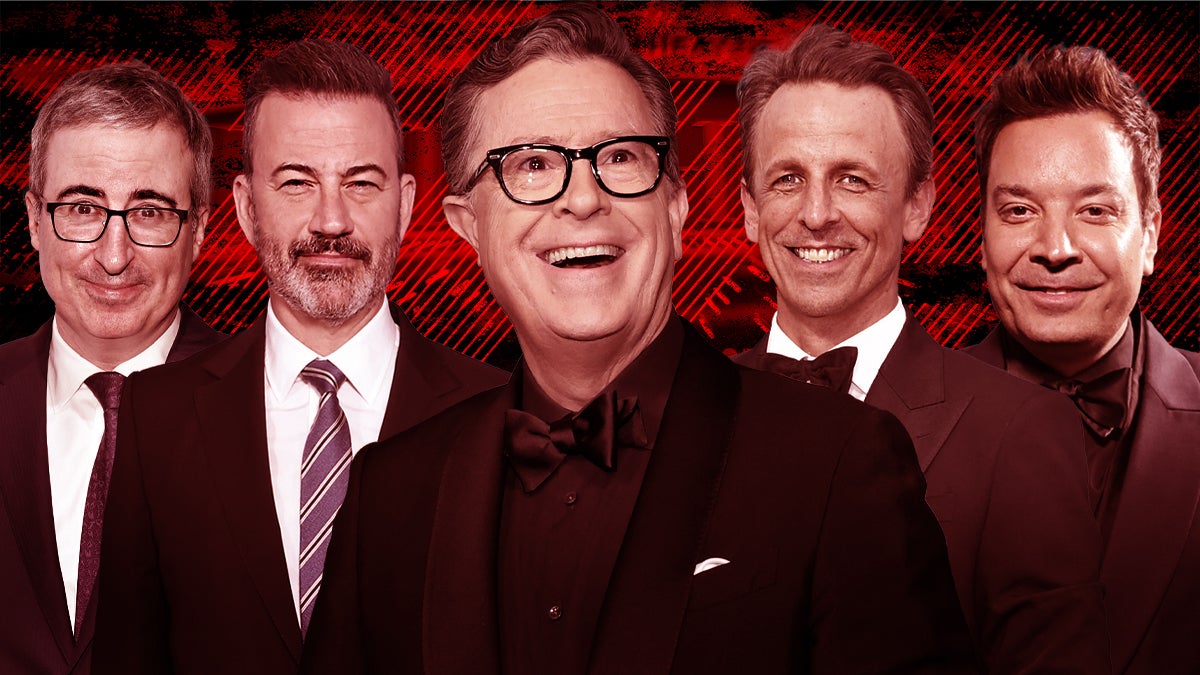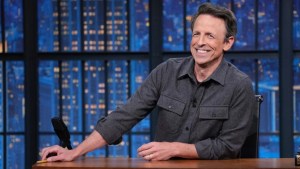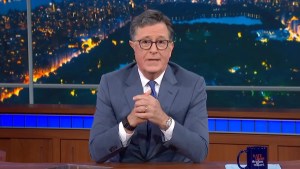In Wes Craven’s 1997 hit slasher “Scream 2,” a movie-obsessed character spouts off the three rules of horror sequels: The body count is always bigger; 2. The death scenes are always much more elaborate; and 3. Never, under any circumstances, assume the killer is dead.
Those same rules could apply to late-night comedy’s approach to tackling Trump 2.0. Just over seven months in, Trump’s threats have already spurred a flurry of corporate parents to ante up large sums of money to settle lawsuits many experts deemed frivolous (higher body count), Stephen Colbert was fired from “The Late Show” mere days after blasting Paramount for paying the president (more elaborate death scene) and a scandal involving Jeffrey Epstein’s client list that would have ended any other president’s tenure continues to be carefully brushed aside by Trump allies in power (don’t assume the killer is dead).
When Trump was initially elected in 2016, late night comedy wasted no time finding humor throughout his first term in office.
But how do you make him funny again? And what happens when the stakes of those jokes now include potentially losing your job?
The questions hang over this year’s talk-show and scripted-variety Emmy nominees: Colbert, Jimmy Kimmel and “The Daily Show” hosts and correspondents in the former category, John Oliver and the “Saturday Night Live” writers and performers in the latter.
Late night comics like Colbert, Kimmel, Jon Stewart, Seth Meyers and “The Daily Show’s” Desi Lydic and Jordan Klepper (the last three of them nominated in the short-form or hosted nonfiction categories) were mixing standard zingers with more pointed critiques throughout the first few months of Trump’s second term, but the heat got turned way up when, in mid-July, Colbert abruptly announced that CBS would be ending “The Late Show” in May 2026.
The announcement came only two days after the show had been nominated for its eighth consecutive talk-show Emmy. While the network said the decision was “purely financial,” the timing raised more than a few eyebrows: The axing came just after Paramount settled its “60 Minutes” lawsuit with the president for $16 million, thus paving the way for Trump-friendly FCC commissioner Brendan Carr to finally approve Skydance’s acquisition of the company one week later.
Stewart went scorched earth on “The Daily Show” the Monday after the decision was made, but — as he so often does — eloquently connected this isolated event to a larger problem looming over the country.
“If you’re trying to figure out why Stephen’s show is ending, I don’t think the answer can be found in some smoking-gun email or phone call from Trump to CBS executives or in CBS’s QuickBooks spreadsheets on the financial health of late night,” Stewart said. “I think the answer is in the fear and pre-compliance that is gripping all of America’s institutions at this very moment, institutions that have chosen not to fight the vengeful and vindictive actions of our pubic-hair-doodling commander in chief.”
Play video

The same night, Colbert told Trump, “Go fuck yourself” and once again called Paramount’s settlement a bribe. Later in the episode, every New York-based late-night host made a cameo appearance on “The Late Show” in a touching proof of solidarity.
So late night has chosen to fight back, but it comes at a perilous time for the medium as the decline of linear viewership has hit these shows particularly hard. Six years ago, the average audience for Colbert’s show was 3.81 million, according to Nielsen. By the second quarter of 2025, it was 2.4 million. During that same period, average viewership has dropped 13% for “Jimmy Kimmel Live!” and 51% for “The Tonight Show Starring Jimmy Fallon.” Ad revenue has experienced a downturn as well.
The dwindling numbers come despite robust social and YouTube performances for many of these brands, but that reach doesn’t make up for the traditional ad dollars lost. Intangibles like brand ambassadorship and viral moments have kept the shows afloat and continue to provide value to their corporate owners. Still, as major corporations bend the knee to Trump after he lashes out at anyone who dares to poke fun, late night comedians find themselves quite literally sticking their necks out.
Evidence of the format’s decline can also be seen in the Emmy nominations themselves. The Television Academy bases the number of nominees in most categories on the number of programs that have qualified in that category, with 20 eligible shows being the baseline that guarantees a full slate of five nominees.
This year, though, Outstanding Talk Series had only 13 programs that qualified, reducing the category’s number of nominees to three, the lowest ever. Outstanding Scripted Variety Series, meanwhile, had just eight entries, giving it two nominees for the fourth time in the past five years. Emmy rules suggest that a category with so few entries should be dropped or combined with another one, but a 2021 decision to merge the talk and sketch categories met widespread criticism. The separate categories were restored before that year’s voting even began.
Now that late night comedy’s uncertain standing at the Emmys has been joined by increasing political pressure, its hosts are aware that they are on shaky ground.
“We’re very clear-eyed about the world we’re living in. We also see these canaries in the coal mine,” Meyers, nominated for his “Late Night With Seth Meyers” short-form YouTube spinoff “Corrections,” told TheWrap prior to the Colbert cancellation. “I don’t feel as though ‘Late Night’ is a quieter voice than it was 10 years ago. I think, ultimately, there are challenges to make it as valuable a property. But we’re not doing our show and thinking we’re just yelling into a void. We feel very heard, and I would prefer that to anything.”
That voice has changed a bit in Trump’s second term, and Meyers admitted that his show — which found its stride and received its first talk-show Emmy nomination as it leaned into politics during Trump’s first term — has needed to pivot.
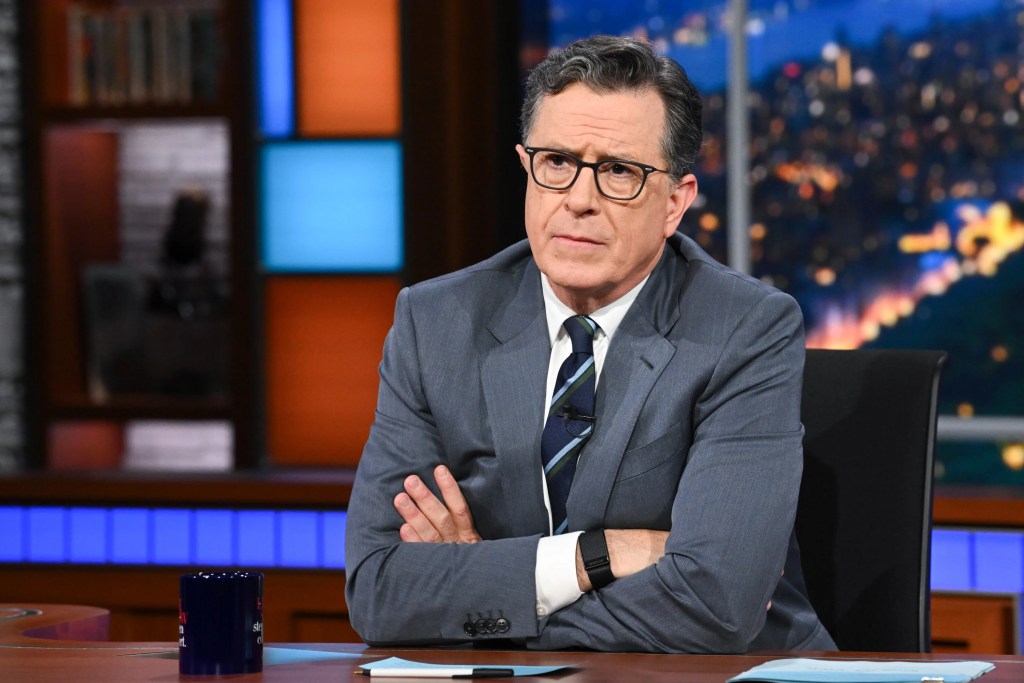 The Late Show with Stephen Colbert Photo: Scott Kowalchyk ©2025 CBS Broadcasting Inc. All Rights Reserved.
The Late Show with Stephen Colbert Photo: Scott Kowalchyk ©2025 CBS Broadcasting Inc. All Rights Reserved.
“We had to shift from sort of this fist-shaking, ‘This isn’t who we are!’ to finding comedy in the fact that this is who we are, and we have to figure out how to be something else,” he said.
Indeed, Colbert, Stewart, Meyers, Kimmel and even Fallon to a degree have all developed a somewhat sharper edge when it comes to their Trump jokes this time around, and they’ve defiantly stayed the course in the wake of Colbert’s axing.
Stewart, again, put it best in that post-cancellation “Daily Show” monologue when he made a direct address to the companies that own the late-night shows.
“Shows that say something, shows that take a stand, shows that are unafraid…” are what made the corporations money, he said. “If you believe — as corporations or as networks — you can make yourselves so innocuous that you can serve a gruel so flavorless that you will never again be on the boy king’s radar…Why will anyone watch you? And you are fucking wrong.”
This story first ran in the Down to the Wire Comedy issue of TheWrap’s awards magazine. Read more from the issue here.
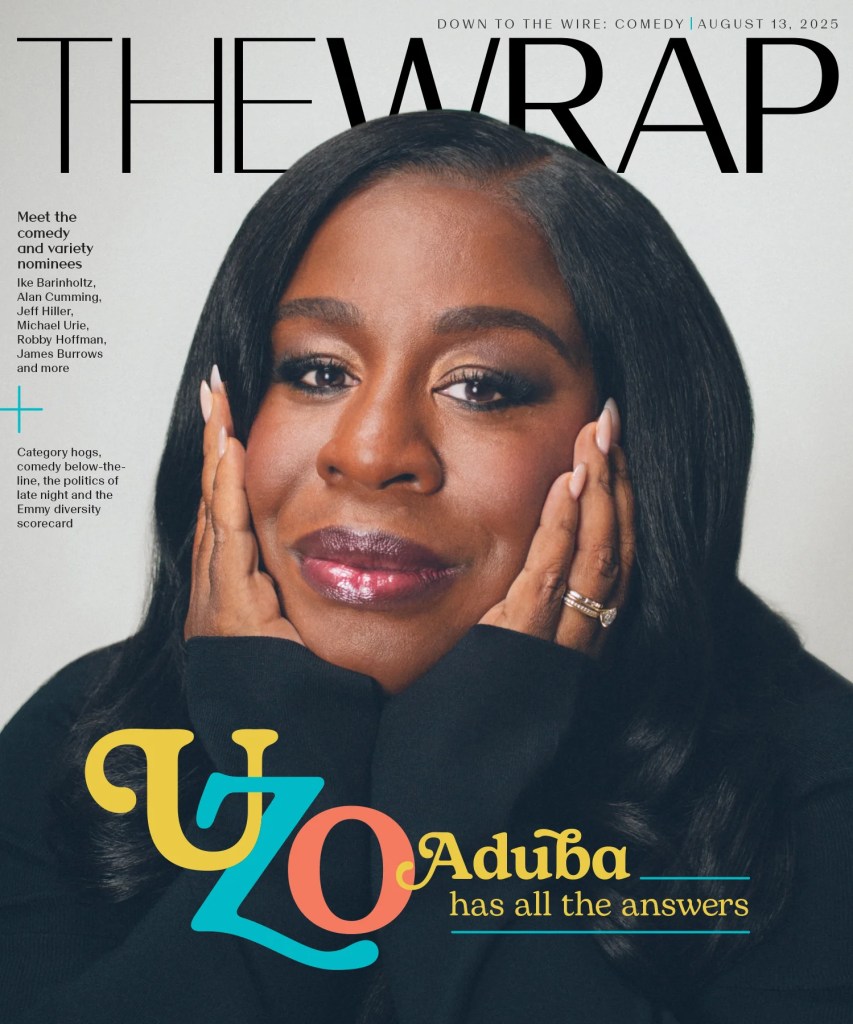 Uzo Aduba photographed for TheWrap by Davey James Clarke
Uzo Aduba photographed for TheWrap by Davey James Clarke

